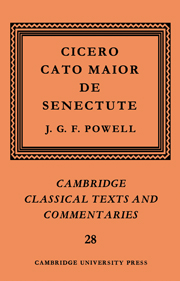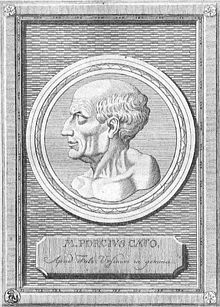Cato Maior de Senectute
Cato Maior de Senectute to German Cato the Elder about the age, is a fictional dialogue of ancient author Marcus Tullius Cicero. The title comes from the fact that Marcus Porcius Cato the Elder, in which there is a historical figure, as 83 -year-old main character occurs in Cicero's work and recites his philosophical views about age.
Content
In the first part of Scripture Cicero dedicates the work to his friend Titus Pomponius Atticus and describes his intention, which is that the two now gradually a higher age (both are in the 60's ) have achieved so Cicero relieve his and Atticus ' age worries wants. Cicero introduces the main players in the action; Then the dialogue begins.
Marcus Porcius Cato talks to Gaius Laelius Sapiens, the main character in Cicero's Laelius de amicitia, and Publius Cornelius Scipio Aemilianus Africanus, called "the younger Scipio ." The hanger of the conversation is that Laelius and Scipio wonder how indemnified and painless Cato seems to bear his great age, while most of his peers tend to complain about the decline of her body and reputation.
The allegations against age were four ( quattuor reperio causas, cur senectus misera videatur § 5, 15).
- It thought of deeds from ( unam quod avocet a rebus gerendis )
- It makes the body weak ( alteram quod corpus faciat infirmius )
- It robs one of almost all pleasures ( tertiam privet quod omnibus fere voluptatibus )
- It is not far away from death ( quartam quod haud Procol absit a morte ).
Cato refuted these allegations in turn, makes reference to a number of ancient Roman figures such as Quintus Maximus, the poet Ennius or Appius and defends age as a necessary and enjoyable life. Its arguments are the following.
- The deeds of old age is not characterized by power, agility and quickness (non viribus aut aut velocitate celeritate ) but by foresight, authority and decisiveness ( consilio auctoritate sententia ). Cicero draws for comparison, the activity of a helmsman who does not rise to the poles or running through the ship, but quietly sitting on the rear deck while but more important is doing than any other (§ § 7-8).
- Not only the age makes the body weak. Weakness often stirred ago by unreasonable conduct. You'll also need less power in old age. Nevertheless, it is true, the mind through regular exercise to strengthen ( Exercitationes engineers ) and so to reign until his last breath on his own and not to indulge in the transience (§ § 9-11).
- Lust is contrary to the reasonable conduct. Consequently, there is no loss, but actually a gift to be exempted from this (O praeclarum munus Aetatis, siquidem id aufert a nobis, quod est in adulescentia vitiosissimum ). The joys of pleasure he provides the joys of spiritual activity of fostering friendship and society, or the study of agriculture ( a favorite subject of Cicero, therefore, quite extensively § § 15-16) against (§ § 12-18).
- The proximity to death is not only our own age. Rather, the old man already has the age, to reach the youth hopes ( ille vult diu vivere, hic diu vixit ). Death is not to be afraid, because this either completely extinguishes the soul or to an eternal life ( Futurus aeternus ) leads (§ § 19-22).
The designs are permeated by excursions in Biographical and Historical and therefore give testimony of ancient Roman thinking and living.
Fictionality
The dialogue is obviously mere fiction and almost devoid of any historical basis. Cato was chosen by Cicero as a main character, because this was enjoying a posthumous, almost hero -like worship in the Roman society of his time, " that the Scripture through it receives an even greater authority" ( quo maiorem auctoritatem haberet oratio, § 3). Cato was known by the nickname " the censor " and famous for its austerity. He was thus in a sense an ideal image of Roman virtues and thus suitable for Cicero's intentions.
Trivia
- The historical Cato had a severe dislike for the beginning Greek influence in the Roman world, although he himself learned Greek in old age. Cicero's Cato is distinguished, however, by many references to the Greeks and their outstanding personalities.
- Cicero's example and boundless self-confidence is also in the Cato Maior clear: " If he ( Cato ) dir ( in my work ) educated seem to discuss when he did it in his own writings, then it pushing on his studies of the Greek Scriptures. " ( Qui si eruditius videbitur disputare quam ipse consuevit in libris suis, attribuito litteris Graecis. § 3)
Editions, translations and commentary
- Cicero: Cato Maior de senectute / Cato the Elder about the age, Latin / German, trans. and ed. by Harald Merklin, Reclam, Stuttgart 2011, ISBN 978-3-15-000803-4
- Cicero: Cato the Elder about age. Laelius on friendship, Latin- German, ed. by Max Faltner, Artemis & Winkler, Dusseldorf ³ 1999.
- Jonathan G. F. Powell: Cato maior de senectute, Cambridge Univ. Press, Cambridge 1988. (Comment)
- Jonathan G. F. Powell ( ed.): M. Tvlli Ciceronis De re PVBLICA. De legibvs. Cato maior de senectvte. Laelivs de amicitia, Clarendon, Oxford, 2006.
- Karl Simbeck (ed.): Marci Tulli Ciceronis Cato maior de senectvte liber, Teubner, Leipzig, 1912.









